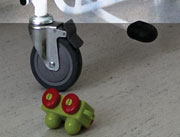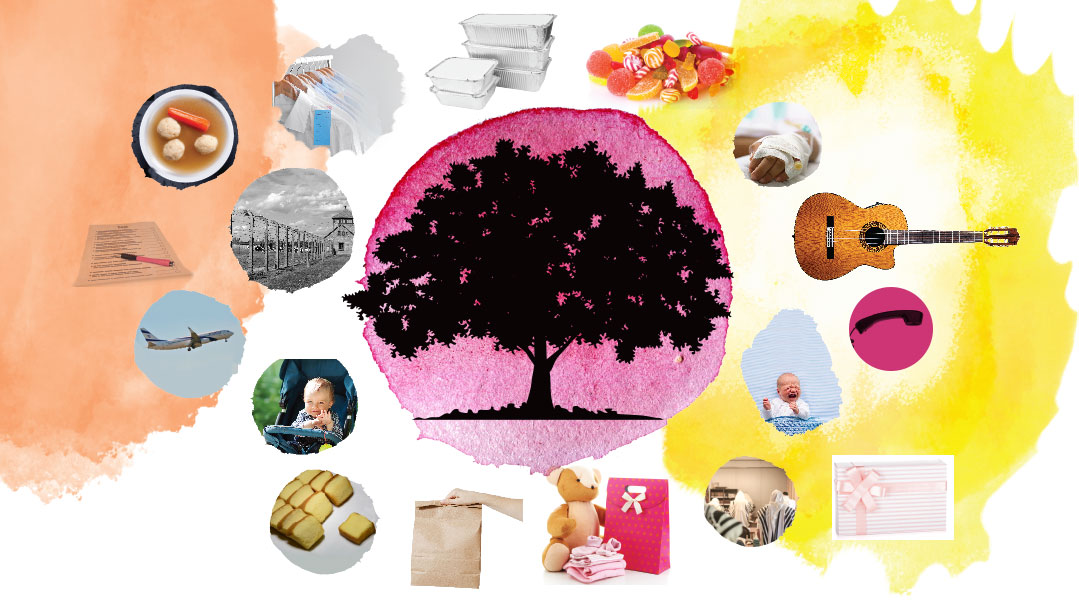A Home for Netanel


When Elinor opened the door to Room 7 on the children’s ward of Mayanei Hayeshuah Medical Center in Bnei Brak she had little idea that the tiny baby who lay there — hooked up to oxygen and a feeding tube — would transform the next four years of her life.
Take Care of My Baby
Armed with a clipboard and a ream of paperwork Elinor pushed open the door. A mother sat in a chair cradling her infant. “Hello Netanel’s Mom ” Elinor began. “What brings you here?”
“We’ve come from Schneider’s Children’s Hospital ” the mother said her voice low and feeble. “Netanel’s been there since he was born. Last week he was back in Intensive Care. When he was no longer in critical condition we decided to transfer here.”
Elinor nodded. She turned her gaze to the infant who lay in the hospital crib dependent on both oxygen and a feeding tube. His facial features quickly identified him as having Down syndrome. His tiny size and lack of movement marked him as suffering from numerous medical issues.
Elinor examined Netanel closely and stroked his thin body. She filled out the forms and prepared to move on to the next intake. As she headed to the door the mother held up her hand. “Stop ” the mother said. “I want you to know that I can’t care for Netanel any longer. I have a family. I’m weak. I’m sick. Please take good care of him.”
Elinor looked more closely. Netanel’s mother was pale and drawn. Elinor watched as she wiped a stray tear gathered her bag and walked out of the ward leaving her baby behind.
The next morning when Elinor entered Netanel’s room she noticed that his tiny leg was stuck between the bars of the crib. The little baby just lay there not crying not even attempting to free himself. For Elinor it was a watershed moment. “I said to myself what’s going on here? This baby doesn’t cry he doesn’t react ” Elinor recalls. “That told me that he was used to being alone. We immediately transferred him to the room closest to the nurses’ station so we could give him a lot of attention.” Efforts were made to reach out to the mother but all overtures were firmly rebuffed. In the meantime Dr. Chana Ofir head of the department focused on stabilizing Netanel.

Netanel suffered from a heart condition and he had difficulty swallowing which caused him to aspirate food into his lungs and led to pneumonia. Although his parents had tried to care for him at home the frequent hospitalizations and his intense needs made this impossible for him. “We admitted him for treatment and rehabilitation. We were aware that this would be a lengthy process.”
Elinor decided to make that process as homey and nurturing as possible to the little baby. His room — until now referred to as the isolation room — became “Netanel’s room.” The plain walls were hung with pictures one nurse brought in a set of pretty blue linen and all the nurses contributed a selection of baby accessories and toys. An unspoken pact had been made between the staff: This baby will not grow up in a cold sterile environment.
With no mother to cuddle and caress whisper and hum the nurses took on the role. Foremost was Elinor who was assigned to fewer patients so that she could spend time caring for Netanel. Every morning Elinor gently washed Netanel and spent an hour massaging him and playing with him.
“Massage is beneficial for every baby ” explains Debbie Bek the head nurse of Elinor’s investment. “It’s especially important for a baby whose baseline is inferior.” After a few weeks Netanel began registering his interest. “He would cry when I stopped the massage ” Elinor recalls. “He wanted more. After a while he learned that there’d be more the next day.”
When Elinor and the other nurses were busy with their duties volunteers cared for Netanel. Elinor brought in gentle music and stimulating toys and taught the volunteers how to challenge Netanel through play.
“He blossomed. You could see he was happy. And then one day he smiled.”
Netanel progressed further, learning the joys of social interaction and even jumping in his crib to the music.
Fight for Life
Netanel’s precarious medical condition meant that sudden fluctuations in his health were part and parcel of his care. His weakened immune system meant that he caught infections easily and often ended up in intensive care. Dr. Ofir was very involved with his health care, and with the parents having withdrawn from his care, the hospital financed all consultations and treatments.
At times, this meant soliciting opinions from professionals in other hospitals. Elinor was on hand to shoulder the burden of his care: “I’d accompany him in one of the hospital ambulances,” she says. Little by little, Netanel’s medical issues were resolved, until the time was right to begin weaning him off a feeding tube. “We recruited a physical therapist, but no one thought she’d succeed,” says Dr. Ofir. “After being fed by a feeding tube for an extended period of time, a child has to be retaught how to eat.”
While the physical therapist could teach the relevant techniques, it was up to the nurses to implement them. Doing so was hugely time consuming, but the nurses persisted, despite the steady pressure of the hospital routine. Netanel learned to eat, and the bouts with pneumonia decreased.
By the age of two and a half, Netanel was a fixture in the ward. His room was a lively, happy place, and despite his nonstandard home, he was showered with love and care. He was eating well, and Dr. Ofir carefully planned the next stage of his recovering health: weaning him off oxygen during the day.
This was a transformative stage. From then on, Netanel was able to take trips out of the hospital, in a stroller purchased by the nurses. The volunteers took him to the park, the shops, and even to their homes, so that Netanel would begin to experience the world outside the ward.
Pushing Forward
“Every child who suffers from chronic disease has developmental delays,” Dr. Ofir explains. “A sick child needs to deal with his pneumonia, not with forming words and sentences. But by that stage, Netanel had stabilized and we decided to invest heavily in his development. For this, we again drew upon the nurses’ love and devotion.”
All the while, the hospital social workers were making efforts to find a loving foster family who would be willing to take on Netanel’s care. But who would take on a two-and-a-half-year-old toddler with Down syndrome, multiple health issues, and significant developmental delays?
With his health stable and no foster family on the horizon, pressure was exerted by the medical insurance company to transfer Netanel to an institution, where his care would be cheaper. One of the nurses involved in Netanel’s care visited the proposed institution and returned distressed. An ad hoc meeting was called, where a unanimous decision was made: sending Netanel to an institution would be detrimental to his development. There, he wouldn’t receive the attention and love he needed, and the upheaval would be devastating. The only transfer they would allow would be into the loving arms of a foster family.
Matters came to a head when the insurance company decided to cut off funding. An emergency meeting was called between the hospital administration and the staff of the children’s ward. “After intense negotiations, the decision was reached that the Health Fund would reimburse the hospital for the cost of care in a rehabilitative facility,” relates Dr. Ofir. “That reimbursement covered roughly half the cost of a day of hospitalization. The other half was contributed by the staff; all of us, from the senior medical staff to the auxiliary staff, deducted from our salaries to pay for Netanel’s care.”
“The volunteers helped too,” Elinor says, completing the picture. “They advertised that we need donations for a baby abandoned in Mayanei Hayeshuah. In this way, the shortfall was covered.”
A Home for Netanel
As if sensing the herculean efforts made on his behalf, Netanel progressed beautifully. With the help of intense physiotherapy, Netanel learned to sit up, crawl, stand, and even walk. Hours of games, exercises, trips, and careful attention helped Netanel advance beyond everyone’s expectations. He learned how to put together short sentences and addressed each nurse by her name.
And then, Netanel’s birthday arrived. This was the fourth birthday Netanel had celebrated in the ward. “Of course, we celebrated with him,” relates Elinor, “with a cake and candies and balloons. He deserved a birthday party like every child. The volunteers brought him presents and took pictures. We made it into a special day.”
It was soon clear that Netanel had outgrown the children’s ward. The nurses’ love and care notwithstanding, Netanel needed a home. Against all odds, a foster family was found — a couple with no children who wanted to give their heart and soul to Netanel, that carefully nurtured, abandoned child.
After a number of meetings between the couple and Netanel, the staff began preparing for his departure. “We made him a big goodbye party,” recalls Debbie. “We invited all of the staff and the volunteers. Even Netanel’s mother came — though her health had further deteriorated. Sadly, soon after Netanel moved to his foster home, his mother passed away.”
Memories were exchanged: “We prepared a beautiful album, filled with pictures taken during Netanel’s stay with us. We remembered the fear when Netanel was rushed to intensive care. We remembered when he took his first step, that moment when we decided that we would not abandon Netanel to an institution. We thought about what we invested in him, and about the nachas he gave us.” Through the years he had been in the ward, Netanel had united the staff with a sense of mission and kindness.
Debbie continues: “We loved Netanel so much, and he didn’t understand that he was about to leave us. We were thrilled that he’d be growing up in a regular home, but we knew we’d miss him deeply.”
“A few days after that wave goodbye, I went to visit him,” Elinor says. “I went to the day-care center where he was in the mornings. At first, he seemed a bit sad, and then he saw me, and immediately smiled and ran toward me. I saw that he missed us, too.”
Slowly, Netanel acclimated to his new family. When his foster parents happen to be in the vicinity, they come to say hello to the staff. “They walk in and Netanel goes straight to his room and makes a beeline for his tape recorder, which he’d always loved,” Elinor says.
Dr. Ofir looks back with pride at her team’s dedication, and connects it with an atmosphere that fosters the recognition that empathy is no less important than antibiotics. “You won’t find something like this in just any place,” Dr. Ofir says. “Here, tired workers remain after their long work hours to give some quality time to a disabled child. They go the extra mile to locate someone who forgot a camera in the ward, or to say a kind word to a mother who went through an especially difficult day with her child. It’s not just about medicine. It’s about kindness.”
(Originally featured in Family First Issue 552)
Oops! We could not locate your form.











